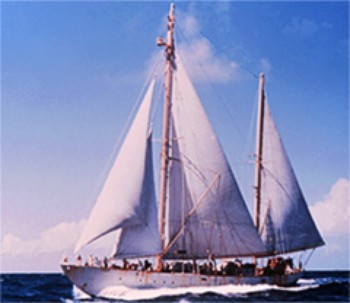RV Atlantis
 |
|
| History | |
|---|---|
|
|
|
| Name: | RV Atlantis |
| Owner: | Woods Hole Oceanographic Institution |
| Ordered: | 1930 |
| Builder: | Burmeister & Wain, Copenhagen, Denmark |
| Laid down: | 1930 |
| Launched: | December 1930 |
| In service: | 1931 |
| Out of service: | 1964 |
| History | |
|
|
|
| Name: | El Austral |
| Owner: | Consejo Nacional de Investigaciones Cientificas y Técnicas (CONICET) |
| Acquired: | July 1966 |
| In service: | 1966 |
| General characteristics | |
| Displacement: | 460 tons |
| Length: | 143' 6" |
| Beam: | 29 ft |
| Draft: | 18 ft |
| Propulsion: | 280 HP diesel |
| Sail plan: | Marconi Ketch |
RV Atlantis is a sailboat that served as the first and also the main research vessel for the Woods Hole Oceanographic Institution from 1931 to 1964. Several ships, including RV Atlantis (AGOR-25) and the Space Shuttle Atlantis (OV-104) were named after Atlantis. The former Atlantis is now commissioned as an oceanographic research vessel in the Argentine Naval Prefecture as the Dr. Bernardo A. Houssay. Having sailed over 1,300,000 miles to date, she is the oldest serving oceanographic research vessel in the world.
Atlantis was the first Woods Hole Oceanographic Institution research vessel and the first ship built specifically for interdisciplinary research in marine biology, marine geology and physical oceanography. The 460-ton Marconi Ketch originally carried a crew of 17 and had room for 5 scientists.Columbus Iselin II, her first master and a major influence in her design, felt that steadiness, silence and cruising range were of greater importance than speed. After her construction was complete, WHOI searched for an appropriate name for the new vessel. Alexander Forbes (1882—1965), a trustee of WHOI, had recently bought a schooner named Atlantis from Iselin. Mr. Forbes rechristened his schooner so the new research vessel could be named Atlantis.
Use of a continuously recording fathometer on Atlantis cruise #150 enabled Ivan Tolstoy, Maurice Ewing, and other scientists of the Woods Hole Oceanographic Institution to locate and describe the first abyssal plain in the summer of 1947. This plain, located to the south of Newfoundland, is now known as the Sohm Abyssal Plain. Following this discovery many other examples were found in all the oceans.
...
Wikipedia
